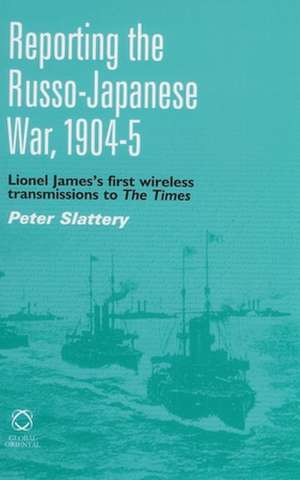Reporting the Russo-Japanese War, 1904-5: Lionel James's First Wireless Transmission to <i>The Times</i>
Autor Peter Slatteryen Limba Engleză Hardback – 28 apr 2004
Preț: 235.46 lei
Nou
Puncte Express: 353
Preț estimativ în valută:
45.09€ • 46.46$ • 37.78£
45.09€ • 46.46$ • 37.78£
Carte indisponibilă temporar
Doresc să fiu notificat când acest titlu va fi disponibil:
Se trimite...
Preluare comenzi: 021 569.72.76
Specificații
ISBN-13: 9781901903577
ISBN-10: 1901903575
Pagini: 170
Dimensiuni: 145 x 225 x 21 mm
Greutate: 0.37 kg
Editura: Brill
Colecția Brill
ISBN-10: 1901903575
Pagini: 170
Dimensiuni: 145 x 225 x 21 mm
Greutate: 0.37 kg
Editura: Brill
Colecția Brill
Cuprins
Acknowledgements; Introduction; Chronology; List of Maps & Illustrations; Chapter 1 Which wireless system?; Chapter 2 The Haimun is chartered and wireless mast erected; Chapter 3 First messages from the Yellow Sea; Chapter 4 Objections from the Russians and British Admiralty; Chapter 5 The Japanese change their minds and halt the Haimun; Chapter 6 James in Manchuria; Epilogue; Appendix 1 The Russo-Japanese War – a brief outline; Appendix 2 Regulations issued to James by the Japanese Imperial Navy; Appendix 3 Lionel James – A short biography; Bibliography; Notes; Index
Notă biografică
Peter Slattery was educated in Dublin and was awarded his PhD from Trinity College on nineteenth-century Irish photographers. He was elected a Fellow of the Royal Photographic Society for his research into the Dublin Photographic Society, 1854-60. In more recent years he has been researching wireless and its development in both Britain and Ireland and has given a number of papers on the subject. He has also contributed to the Dictionary of Irish Biography to be published jointly by Cambridge University Press and the Royal Irish Society. At present, Dr Slattery teaches history at St Aidan’s, Whitehall, Dublin.
Descriere
Large numbers of British military and naval officers as well as journalists and others observed the Russo-Japanese War from close quarters. But there was one journalist in particular, the Times’ correspondent, Lionel James, who made war-reporting history by gaining access to the conflict zone of the war at sea and reporting by wireless from a specially chartered ship as the action happened. The full details of this remarkable and highly dangerous exploit have been carefully pieced together from official Times records and other sources by Peter Slattery and recorded here for the first time, including the story of how the vital 180-foot timber wireless mast was built on the British-leased tree-less promontory of Weihaiwei on the China coast. James’s first report was published in The Times on 15 March 1904; he subsequently went on to file many other despatches, including the sinking of the Russian flag-ship the Petropavlovsk. The World Powers, however, were not ready to accept that a mere journalist should be allowed to exploit the new wireless technology to gain reporting advantage and forced James to give up, causing him to move inland into Manchuria to continue his reporting of the war. From there, he was to send a 5000-word story on one of the major land battles of the war at Liaoyang – the longest cable ever filed. There was also the matter of James’ special deal with the Japanese Imperial Navy, which only now has come to light.
